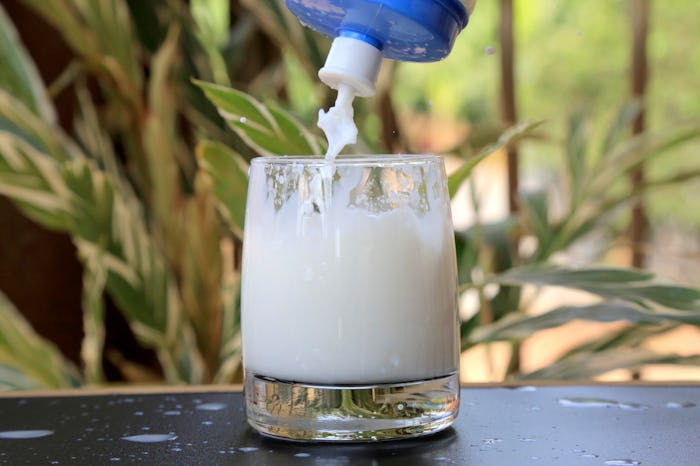Researching any nutritional topic can get confusing in a hurry, and this holds true for infant nutrition as well. One simple search about your baby's diet can lead you down a rabbit hole of information (and misinformation). For instance, you may be wondering do you need to give your baby calcium or will he get enough of it through his regular diet? Because you want to make sure your little one grows up with strong bones.
To begin with, it helps to understand the importance of calcium in your baby's diet. Calcium is a mineral that's crucial for building bones, as well as muscle and nerve functioning, according to Kids Health. It's often described as one of the key building blocks for strong bones growth, so your baby needs a steady supply of calcium. Without enough calcium in his diet, your baby may be at risk for rickets, a painful bone-softening disease that can inhibit growth, as further noted by Kids Health. Basically, calcium is a critical component of your kid's healthy development.
With that in mind, how much calcium does your baby need each day to grow those healthy bones? According to the National Institutes of Health, babies under 6 months of age need 200mg of calcium per day, whereas 6 to 12 month olds require about 260 mg per day. To put this in perspective, one cup of milk typically contains 300 mg of calcium, as noted by the University of California San Francisco Medical Center. It sounds simple enough, but you may be concerned about whether your baby needs calcium supplementation.
Fortunately, your baby may not require any additional help getting that daily calcium hit. Going by measurements from the United States Department of Agriculture's National Nutrient Database, one cup of breast milk contains about 79 mg of calcium. Chances are, your little one is getting enough calcium via breastfeeding. If you have any concerns, of course, feel free to discuss them with your physician.
And mamas who use formula likely don't have to fret, either. According to the USDA's National Nutrient Database, one cup of infant formula contains approximately 400 mg of calcium. Of course, the exact components of your formula may vary, so it's smart to double-check your baby's calcium intake with a pediatrician if you have any questions.
Once your baby starts eating solid foods, there are tons of options to keep his calcium intake high. Most people rightfully associate milk and dairy products with calcium, but there are loads of other foods that are packed with this vital mineral. Leafy green veggies, such as collard greens, spinach, and turnip greens, all contain 50 to 66 mg of calcium in just 1/4 cup, according to Baby Center. A varied diet rich in dairy and these veggies will help your baby keep that calcium intake high.
Because calcium is so good for your little one, you may be tempted to help your kid max out his calcium intake with supplements. However, this is probably not necessary. As noted in Pediatrics, there are no findings that indicate exceeding your baby's daily calcium intake will result in any long-term benefits. In general, it's a smart move to make sure your baby has enough calcium in his diet every day, but there's probably no reason to bombard him with extra supplements. With milk or formula and a healthy diet, your baby is set to make those strong bones to last a lifetime.
